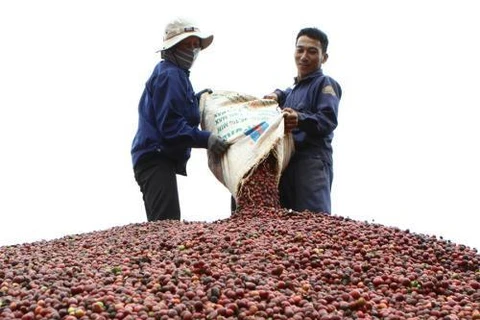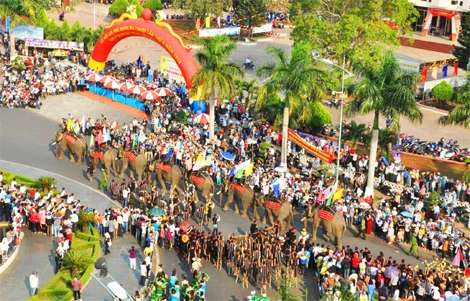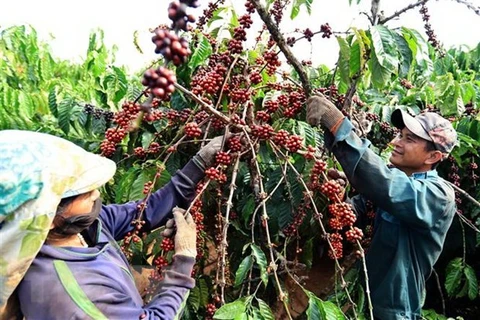Hanoi (VNA) - A database of coffee areas would be used as a digital tool to assist partners in managing coffee plantations and quality in Vietnam, participants heard at a workshop held by the Ministry of Agriculture and Rural Development (MARD) and Global Coffee Platform (GCP) in Hanoi on May 23.
The database will assess how Vietnamese coffee farmers understand and adopt good practices for sustainable coffee production following a pilot programme held in Di Linh district in the Central Highlands province of Lam Dong with the participation of more than 8,500 coffee households.
The database will monitor origins, seed use, status and management of land, water sources, irrigation systems and inter-cropping.
According to Le Van Duc, Deputy Director of the MARD’s Plant Cultivation Department, coffee needed origin certification for sustainable development towards improving quality, added value and food safety.
It is very important to build a database with area codes to assess the origin of coffee products, Duc said.
He said the database would be available to help farmers to manage production input, helping businesses trace origin and direct investment into production.
In order to expand this system, GCP’s chief representative in Vietnam Tran Quynh Chi said Lam Dong province would work with the MARD and GCP to build a roadmap to develop the database system to the whole province.
For other provinces, the GCP is working on other projects in the coffee industry to support farmers and help these provinces apply the system, Chi said.
"We need to apply this system on a large scale otherwise it would not be effective. We also need to apply it uniformly to an entire region, and then we will have an overview of the coffee industry," she added.
According to Chi, the MARD had a number of programmes for sustainable coffee development, including the Vietnam-Sustainable Agriculture Transformation Project (VnSAT). These programmes are helping the ministry to expand the database. On that basis, the ministry can develop guidelines for provinces to build their own budgets and collect data.
In 2018, Vietnam had 680,000 hectares of coffee plantations with a yield of 2.5 tonnes per hectare. The country exported 1.8 million tonnes of coffee with a value of 3.5 billion USD last year.-VNA
The database will assess how Vietnamese coffee farmers understand and adopt good practices for sustainable coffee production following a pilot programme held in Di Linh district in the Central Highlands province of Lam Dong with the participation of more than 8,500 coffee households.
The database will monitor origins, seed use, status and management of land, water sources, irrigation systems and inter-cropping.
According to Le Van Duc, Deputy Director of the MARD’s Plant Cultivation Department, coffee needed origin certification for sustainable development towards improving quality, added value and food safety.
It is very important to build a database with area codes to assess the origin of coffee products, Duc said.
He said the database would be available to help farmers to manage production input, helping businesses trace origin and direct investment into production.
In order to expand this system, GCP’s chief representative in Vietnam Tran Quynh Chi said Lam Dong province would work with the MARD and GCP to build a roadmap to develop the database system to the whole province.
For other provinces, the GCP is working on other projects in the coffee industry to support farmers and help these provinces apply the system, Chi said.
"We need to apply this system on a large scale otherwise it would not be effective. We also need to apply it uniformly to an entire region, and then we will have an overview of the coffee industry," she added.
According to Chi, the MARD had a number of programmes for sustainable coffee development, including the Vietnam-Sustainable Agriculture Transformation Project (VnSAT). These programmes are helping the ministry to expand the database. On that basis, the ministry can develop guidelines for provinces to build their own budgets and collect data.
In 2018, Vietnam had 680,000 hectares of coffee plantations with a yield of 2.5 tonnes per hectare. The country exported 1.8 million tonnes of coffee with a value of 3.5 billion USD last year.-VNA
VNA
























